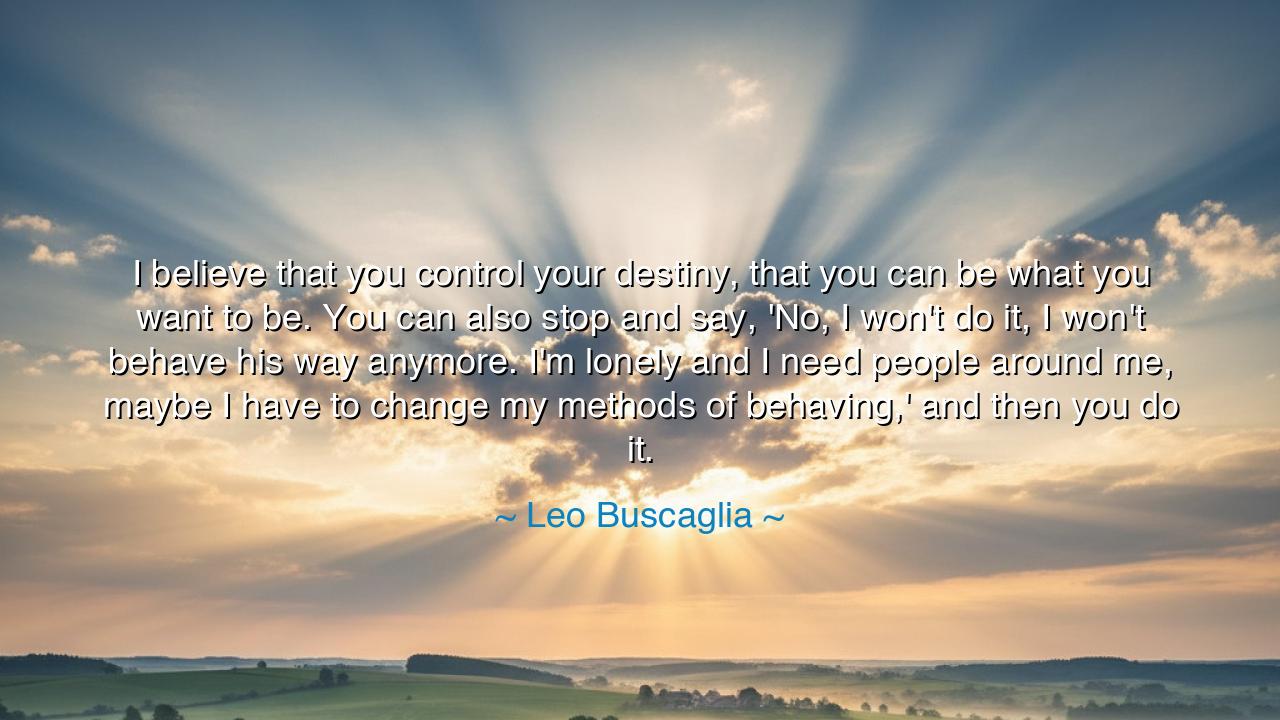
I believe that you control your destiny, that you can be what you
I believe that you control your destiny, that you can be what you want to be. You can also stop and say, 'No, I won't do it, I won't behave his way anymore. I'm lonely and I need people around me, maybe I have to change my methods of behaving,' and then you do it.






"I believe that you control your destiny, that you can be what you want to be. You can also stop and say, 'No, I won't do it, I won't behave his way anymore. I'm lonely and I need people around me, maybe I have to change my methods of behaving,' and then you do it." These words by Leo Buscaglia speak to the heart of personal empowerment and the transformative power of choice. Buscaglia’s assertion is a call to action for all those who feel trapped by their current circumstances or behaviors. He reminds us that we are not passive participants in life; we have the ability to shape our destiny through conscious decisions and self-reflection. The ability to say "no" to an old way of being and to choose a new path is the essence of freedom and growth.
In the ancient world, self-determination was a concept deeply revered. Socrates, the great Greek philosopher, famously declared, "An unexamined life is not worth living," urging people to reflect on their choices, actions, and direction in life. He believed that through reason and self-awareness, individuals could free themselves from the constraints of ignorance and societal expectations, choosing instead to live in accordance with their true nature. Socrates believed that our destiny was shaped by our own actions and decisions, not by fate or external forces, and this idea resonates deeply with Buscaglia's message that we control our own fate.
Similarly, in ancient Rome, the Stoic philosophers like Epictetus and Marcus Aurelius championed the idea that we are the masters of our own reactions and that we have the power to shape our lives, regardless of external circumstances. Epictetus famously said, "It’s not what happens to you, but how you react to it that matters." For the Stoics, the ability to change one's behavior, to shift one’s mindset, was central to living a life of virtue and integrity. This idea parallels Buscaglia's concept of changing your methods of behaving when you feel disconnected or lost, taking control of your destiny by shifting your approach to life.
Take, for example, the life of Mahatma Gandhi, whose transformation was a testament to the power of personal choice and self-reflection. In his youth, Gandhi was deeply affected by the racial discrimination he faced in South Africa, and initially, he reacted with anger and resentment. However, after much introspection and study of nonviolent principles, Gandhi chose a new path: the path of ahimsa, or nonviolence, in both his personal life and his political actions. His decision to change his behavior, to choose love over hatred, and to embrace self-discipline over anger, was a revolutionary act. Gandhi believed that by controlling his reactions, he could shape not only his own future but also the future of an entire nation.
This power to change is also reflected in the life of Nelson Mandela, who, after years of imprisonment, emerged with a vision of reconciliation rather than revenge. His decision to forgive his captors and work toward a unified South Africa was a deliberate choice to change his behavior and approach to the world. Despite the immense pain and injustice he suffered, Mandela chose to let go of the bitterness and instead embraced the power of forgiveness and compassion. In doing so, he became a symbol of hope and transformation, showing that we have the power to reshape our destiny by altering our actions and mindset.
Leo Buscaglia’s words reflect an ancient and timeless truth: the power to choose is one of the most profound abilities we possess. It is within our grasp to change our thoughts, actions, and behaviors, even when we feel stuck in old patterns. Self-awareness is the first step in this process—recognizing when our current actions no longer serve us and acknowledging the need for change. It is courage to admit that we have the power to do something differently, to break free from old habits or limiting beliefs, and to choose a new path. Change is not always easy, but it is always possible when we take responsibility for our actions and commit to growth.
The lesson here is clear: we are the authors of our own stories, and by making conscious decisions, we can rewrite the narrative of our lives. When faced with loneliness, discontent, or frustration, we can choose to change our methods of behavior, adjusting our actions to align more closely with our true selves and our deeper needs. Just as Socrates and Epictetus taught, and as Gandhi and Mandela demonstrated, the power to reshape your destiny lies within you. The path to personal freedom and fulfillment begins with a single decision: to be true to yourself, to take responsibility for your actions, and to embrace change when it is needed.
In your own life, ask yourself: are you ready to take control of your destiny? Are there behaviors or patterns that no longer serve you, and are you willing to change them? It’s never too late to shift course, to choose a new way of being, and to shape your life in a way that brings you closer to your highest self. Live consciously, choose wisely, and know that in every moment, you hold the power to change the direction of your life. The future is yours to shape.






AAdministratorAdministrator
Welcome, honored guests. Please leave a comment, we will respond soon